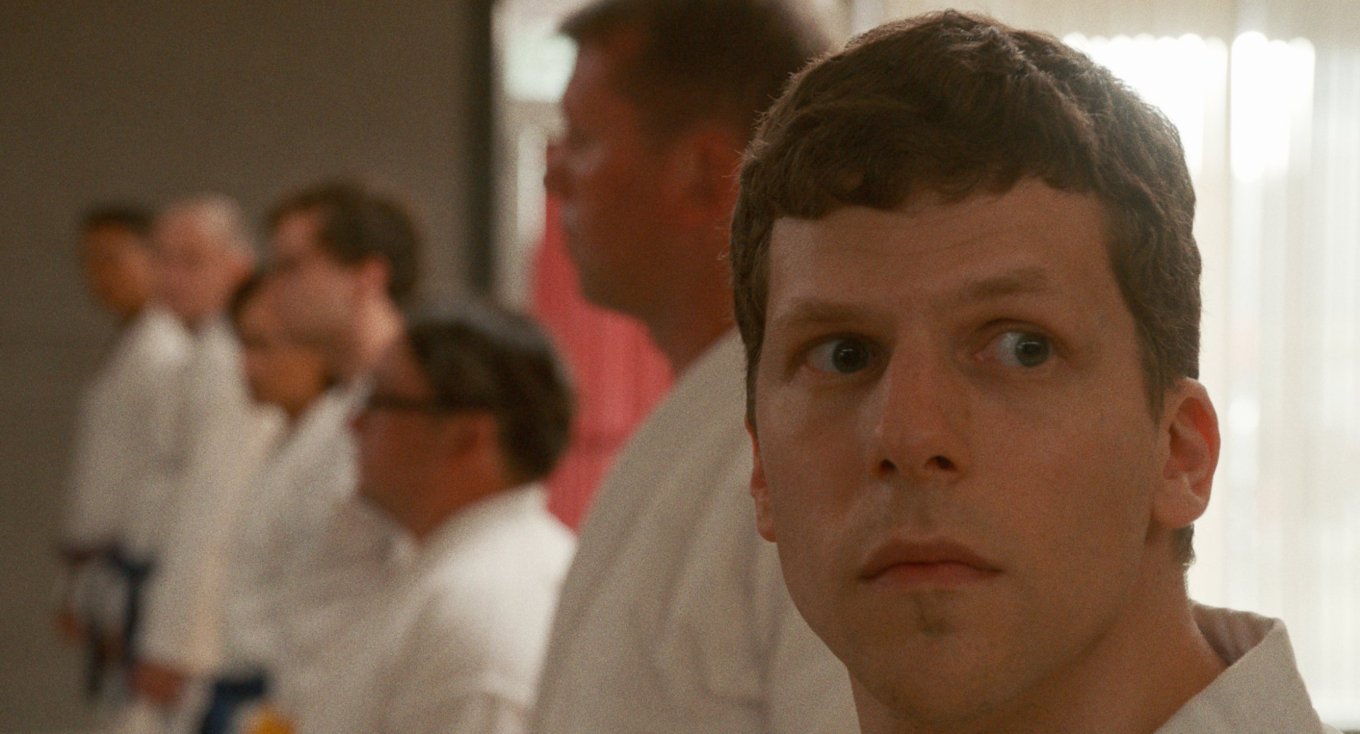 Not since Fight Club has a film explored masculinity in all its strengths and weaknesses with such depth. At a time when our society is struggling to reconcile with the excesses of a historically patriarchal system, it’s become a bit of a hot button issue to criticize someone along the lines of gender. I often find myself brusquely pushing back against such cinematic explorations, as they are often couched in thinly-veiled power flexes. So perhaps there’s a bit of an identarian aspect informing my thoughts on this dark, biting satire. Much in the same way a Philadelphian can talk about how rude we are as a point of pride while condemning outsiders who agree, I found myself offering no resistance to Stearns’ scathing takedown of the ridiculousnesses inherent to aggressive maleness. He’s one of us, so he’s allowed to let me know I’m lame.
Not since Fight Club has a film explored masculinity in all its strengths and weaknesses with such depth. At a time when our society is struggling to reconcile with the excesses of a historically patriarchal system, it’s become a bit of a hot button issue to criticize someone along the lines of gender. I often find myself brusquely pushing back against such cinematic explorations, as they are often couched in thinly-veiled power flexes. So perhaps there’s a bit of an identarian aspect informing my thoughts on this dark, biting satire. Much in the same way a Philadelphian can talk about how rude we are as a point of pride while condemning outsiders who agree, I found myself offering no resistance to Stearns’ scathing takedown of the ridiculousnesses inherent to aggressive maleness. He’s one of us, so he’s allowed to let me know I’m lame.
Granted, I don’t subscribe to the notion that criticism of males is something only males can do (that’s a dangerous notion for any group to think that way, in my humble opinion), but when it comes to receiving criticism in a way that doesn’t feel preachy, it’s voices like Stearns’ that make self-reflection more than just possible – he makes it fun.
Jesse Eisenberg plays Casey Davies, and awkward man with few friends outside of his shivering dachshund. He’s quiet, weird, and anything but an alpha male. Hell, he’s not even a beta male. He’s somewhere around psi or omega. His world is one of posturing, and it doesn’t jibe with Casey’s meek personality. His days are spent as an auditor at an office filled with men who chit chat about doing pushups or which sex position is their favorite. His nights are spent at home watching television shows that seem designed to make him feel like less of a man. Even his answering machine behaves with passive aggression, saying things like “No one else has left you a message,” and “PLEASE delete your messages.”
After being brutally mugged and beaten while obtaining dog food for his only friend (the brand name being simply “DOG FOOD”), Casey decides it’s time to take control of his life. He enrolls in karate lessons at a dojo positively dripping with masculinity at its most toxic. His Sensei (Alessandro Nivola, in what is easily my favorite performance of 2019 so far) offers Casey something he hasn’t seen in quite some time, if ever: validation. Sensei takes stock of Casey’s life, offering him a million different ways to “man up.” He advises him to stop learning French and start learning German. Adult contemporary music must be traded for heavy metal. If Casey wants to make it in a dog eat dog world, he must take what he is owed and let no one stand in his way. Casey, who is often reminded by Sensei that his name is rather feminine, finds (unearned) strength in this validation, and soon finds himself being radicalized into Sensei’s world — a world that goes deeper and grows darker than anyone could ever expect.
Stearns’ pervious directorial effort Faults tells the story of an attempt to de-program a young woman whose family is trying to break her free from a cult. In The Art of Self-Defense, Stearns shows us the opposite. How does someone who could easily be described as a victim become radicalized so efficiently? Is it due to rejection from a world that doesn’t offer wiggle room in its definition of masculinity? Is it due to predatory validation systems designed to give false strength to those lacking in self-identity? The answer here seems to be both, which makes the subject matter that much more terrifying. Fortunately for us, Stearns has a masterful command of absurdist, dry humor that keeps things fun and funny even as the story gets urgent and upsetting.
This is Fight Club by way of Napoleon Dynamite, filtered through the lens of Jody Hill. But even making such an honorable comparison is to cheapen what Riley Stearns has to offer. This is a truly unique film which establishes Stearns as both an important voice and an exciting visual storyteller. His style is purposefully uncomfortable, placing bodies half in frame, too close to the lens, positioned to keep the viewer on their heels while also remaining engaged with the material. It’s aggro without being sensually offensive, but it’s not meant to go down so easy. This is a satire meant to shake down the patriarchy, and it does so with an absurdist wit that defies simple description.
The Art of Self-Defense was part of the 2019 PFF Spring Fest, April 12-14, 2019. It is scheduled for nationwide release in July 2019.
